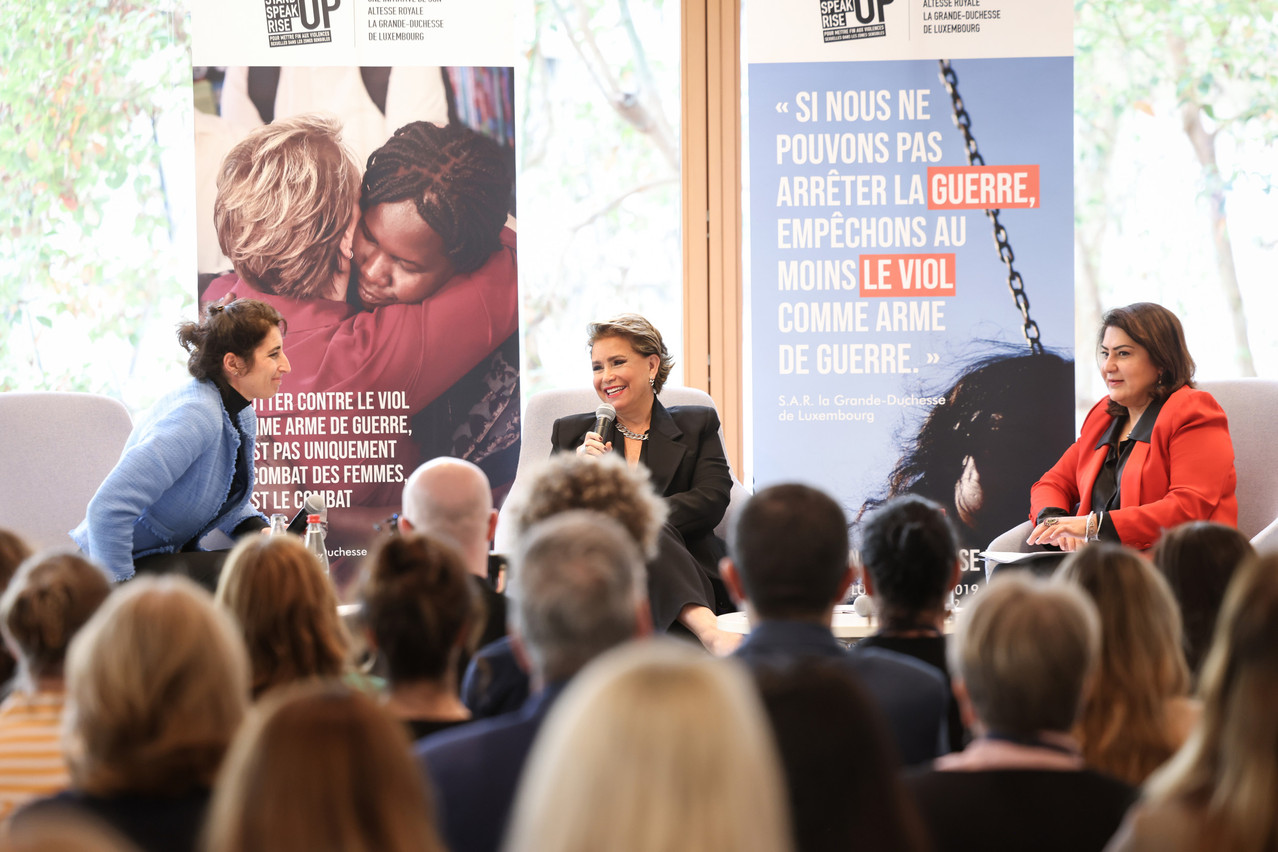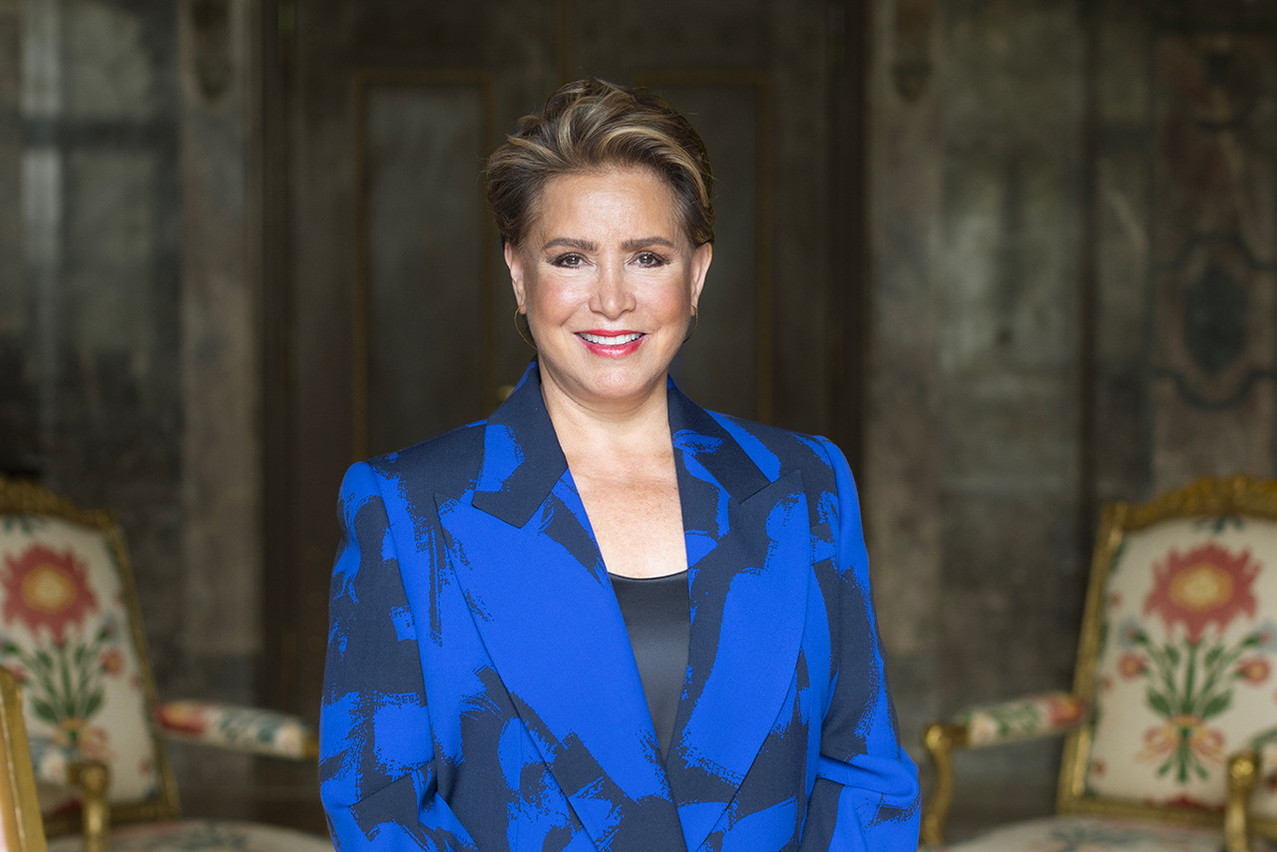Maëlle Hamma: How did you discover this phenomenon and why did you want to get involved in this cause?
: I discovered this phenomenon thanks to Dr Denis Mukwege [Congolese doctor who received the Nobel Peace Prize in 2018, editor’s note], during a conference that shocked me. He explained to me that there was a group of survivors from all over the world who were victims of rape as a weapon of war. This made me realise that this is a global problem. These survivors were not being heard by anyone and needed visibility. This is completely in line with the way I’ve always acted, because I’ve always thought that in my position, I want to be the voice of those who are least wanted to be heard. So we came up with the idea of organising a forum in which the survivors would be at the heart of the event.
The forum was the catalyst...
Yes, at the time, the association had not yet been created. But there really was a before and after. It was the first forum in which the main people concerned were at the heart of the forum. They got up on stage and spoke in front of 1,500 people. It was a great success. We were able to bring to the attention of the United Nations a situation about which very little was known at the time: the plight of children born of rape. A UN resolution was passed following the forum. But at the time, there was no large-scale war in Ukraine, no 7 October, and few people were aware of this phenomenon. The world didn’t really feel concerned.
Today, people are (unfortunately) forced to face up to this reality, even though it may be disturbing.
Has anything changed today?
Yes, thanks to the forum, but also because of two dramatic situations: Ukraine and 7 October [2023]. All of a sudden, we realised that this was a very topical issue, very close to home. Initially, when we approached banks or companies, some didn't want to help us because they didn't want to be associated with this theme... Since the war in Ukraine, the invasion of the Donbass and the first accounts of the victims, we have found ourselves plunged into this reality that is taking place a few hundred kilometres from Luxembourg. It was a wake-up call before 7 October and all the horrors we saw and heard.
Today, people are unfortunately obliged to face up to this reality, even though it may be disturbing, and this is leading to a freeing of speech. What’s more, even in our own countries, women are victims of domestic violence and rape in the secrecy of their marital relationship. It’s also a horror that we’re hearing more and more about. Dr Mukwege also explained that rape in countries at war is just an exponential increase on the rapes that are commonplace in all our societies. These stories are extremely difficult, but they must be heard today.

Pramila Patten, Céline Bardet, Dr Denis Mukwege, Grand Duchess Maria Teresa, Charlotte de Turckheim and Stéphane Bern at the Biarritz Gala, 15 October 2022. Photo: SSRU/Julio Piatti
After the forum, you decided to create the association Stand Speak Rise Up! in 2019. Why did you do this?
Once the forum was over, I couldn’t let these women down. We had forged a very special bond. I said to myself that indignation wasn't enough, that we couldn’t leave it at that, and that we had to keep this action going. So, together with Chékéba Hachemi [activist and first female Afghan diplomat, editor’s note] and Stéphane Bern, I was able to set up the association to enable ongoing action to help the survivors. The association’s work is based on both advocacy and concrete action.
Why is this subject still taboo today?
I think the taboo will inevitably remain, because rape as a weapon of war is a way of destroying the human person, the woman. I’ll never forget what the survivors told us: “We’re the living dead, we’re destroyed inside. And my whole aim was, through recognition, to help them rebuild their lives so that they could once again hold their heads high and regain their self-confidence.

Chékéba Hachemi (right) is co-founder of SSRU. She is the first Afghan woman to have been a diplomat and is the author of the novel “L’Insolente de Kaboul.” Photo: Maison du Grand-Duc / Sophie Margue
What are the consequences for women who are victims of such crimes?
Rape as a weapon of war is a cluster bomb that damages entire generations. Because you destroy the woman, her descendants, her village, her family, her social fabric. Everything is blown up. These women are subjected to repeated double punishment because not only are they destroyed by the rape, but they are also rejected by their community. Their children born of rape are also rejected. Many of these women have been forced into prostitution, for example, because they have no other option.

As well as helping survivors, Stand Speak Rise Up! is also working to help children born of rape. Here, Sylvia Acan, a survivor attending the forum in 2019, surrounded by the beneficiaries of the education project for children born of rape in Uganda. Photo: SSRU
Do we now know how many women are affected by this scourge?
No, we don’t have any figures, because many victims don’t talk about it. I think if we knew the true number of victims, we'd be absolutely horrified. But we do know, for example, that in the Congo, in the Great Lakes region, there are around fifty women raped every day, rapes that are accompanied by torture.
What concrete action are you taking to help them?
We have many projects around the world. But the most important thing for us is to enable these women to become autonomous and independent. Some of the women who took part in the forum have become presidents of associations in their own countries that help other women, like Tatiana Mukanire, a victim from the Democratic Republic of the Congo who has written her own book, published by Éditions des femmes, thanks to the support of Stand Speak Rise Up! She is also the head of a movement that helps these women to set up their own businesses.
We also support micro-projects, school projects for children born of rape, as in Uganda. We may be a very small NGO, but we’re one of the few that deals with the plight of children born of rape. This has also given rise to real communities of mutual support in the countries of the victims: they share their best practices, their experiences…
One of your objectives is to help these women become economically independent. Why is this a key element in their reconstruction?
The aim of using rape as a weapon of war is to destroy these women so that they are no longer able to return to the community. So one of our aims is to bring them back into the community, through access to housing, for example, to make sure they are never thrown out again. This also involves support grants. Women need to be financially independent to be able to make their own choices. But Stand Speak Rise Up! is also able to respond to emergency situations, such as in Afghanistan, where terrorists are walling up 28m women alive. Our emergency food aid is helping these women, who three years ago were still lawyers, teachers and journalists. We are also supporting a medical project to train midwives, as well as providing study grants for young Afghan women who find themselves in refugee camps in Iran and Pakistan.

Grand Duchess Maria Teresa and Chékéba Hachemi regularly visit companies and institutions to raise awareness, as here at the European Investment Bank in Kirchberg in October. Photo: SSRU / Sophie Margue
What progress has been made on the legal front?
We work with a Swiss association called Trial International, which has taken up the issue of children born of rape and the question of reparation. This has produced concrete results, as in Bosnia and Herzegovina and elsewhere. We are working with this association to try to find those responsible for these horrors and bring them before the International Criminal Court and the competent courts, because rape is a war crime that constitutes crimes against humanity and crimes of genocide. At our level, we know that we can’t do everything, so we join forces with other associations and organisations defending this cause to be as effective and efficient as possible, always with the aim of ensuring that our aid goes directly to the survivors we know.
Why is it also in the interests of businesses to take an interest in this issue?
Corporate social responsibility means that staff are increasingly interested in knowing how they can help. It’s important for us, because it’s a way of getting people talking about the issue and raising funds to help survivors. What’s more, we have no public subsidies: the association relies on private donations. We also take a holistic view, meaning that we intervene to help people at several stages of their reconstruction, right up to their empowerment. This involves psychological and social support, equipment, etc. Today, several Luxembourg companies support us, such as Luxair, with the support of Gilles Feith, and we have a whole network of ambassadors who are very committed people. We are also working on skills sponsorship and on a remote mentoring project for survivors.

Here is the Luxair plane in the Stand Speak Rise Up! colours. The design was created by Madhurika Modani and reflects the stories of women who have experienced suffering, symbolised by torn pieces of paper. Photo: Luxair
What are the association’s plans for the next five years?
With the lieutenancy in place and the abdication in due course, I’ll be able to devote myself more than ever to Stand Speak Rise Up! so that I can continue to support survivors in their reconstruction. I’m delighted about that. Our motto remains “Nothing about us without us,” meaning that we do nothing without the main people involved, the survivors. We don’t claim to be able to stop wars, but if we can at least ensure that rape is no longer a weapon of war, we will have already taken a big step.
This article was written in for the magazine, published on 20 November. The content is produced exclusively for the magazine. It is published on the site as a contribution to the full Paperjam archive. .
Is your company a member of the Paperjam Business Club? You can request a subscription in your name. Let us know at

